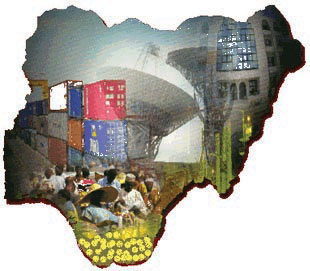Economy: Research reports, FG differ on major indices


By Peter Egwuatu
Against the backdrop of recently set targets in the revised 2020 budget and the approved Federal Government’s National Economic Sustainability Plan, NESP, research reports by some investment houses have indicated that macroeconomic outcomes would be far off targets by year end 2020 into 2021.
Despite the estimated stimuli amounting to N2.3 trillion, output levels measured by the Gross Domestic Product, GDP, cost of living measured by inflation rate, as well as other key indices such as unemployment levels and exchange rate are likely to be weaker than FGN’s projections, according to independent research reports obtained by Financial Vanguard.
Nigeria’s economy had come under pressure since first quarter of this year following outbreak of the COVID-19 pandemic and oil price shock which completely overturned the entire 2020 budget as approved by the National Assembly in December 2019, forcing a fresh budget and also the NESP to address the economic impact of the pandemic.
The research reports were the first set of comprehensive reviews of what has happened to the Nigerian economy since this year (H1’20) and the spillover into second half (H2’20) as well as 2021.
READ ALSO:N700m fraud case: Buhari aware of PDP’s attack against me— Ize-Iyamu
Fiscal projections
Government’s revenue and deficit projections were based on adverse developments in the international oil market. Consequently, oil price assumption was reduced by 50.9% to $28.00/bbl. while oil production was cut 17.4% to 1.8mb/d following output cuts agreement reached to support oil prices.
However, the expected shortfalls in revenue would be augmented with more Naira cash as the Central Bank of Nigeria, CBN, was made to devalue the official exchange rate by 15.3%, a development which also reflected the deterioration in external accounts and falling external reserves.
The revision made to the assumptions translated to projected revenues of N5.4 trillion, which is 36.3% weaker than initial expectations. Projected oil revenue has been revised downwards by 60.3% to N1.1trillion while non -oil revenue was reduced by 10.0% to N1.6 trillion.
Other revenues including asset sales and renewals, fines, domestic recoveries and donor grants were cut 43.0% to N1.7 trillion.
Despite the much weaker revenue expectations, projected expenditure was increased to N10.0 trillion (excluding Government Owned Enterprises, GOEs) from N9.7trillion.
Consequently, while the Federal Government expects a total fiscal deficit of N4.6 trillion in 2020, the research analysts expect it to be much higher given the significant increase in borrowings in 2020.
They also differ with the Federal Government’s debt sustainability target as they expect government’s debt sustainability indicators to deteriorate.
They further noted that inflation would rise beyond the Federal Government’s target of 11.9% despite the stimulus packages that have been earmarked.
They added that with high foreign exchange volatility and increased Value Added Tax, VAT, resulting in inflationary pressures, there would be deterioration in the purchasing power of consumers brought about by a decrease in income, outright job losses, increased unemployment and under-employment.
Assessing the impact of COVID-19 on the economy, the research analysts anticipate a partial recovery in H2’20 as the containment measures of COVID-19 are relaxed with the re-opening of major cities in Nigeria and external trade partners.
However, they opined that rising trend in employment at about 31.45% as at Q1’20 would continue in H2’20, noting that as price increases, there is a decline in competitiveness and export demand becomes lower. As such, unemployment in the external sector would rise.
GDP forecast for 2020
In their reports for the H2’20 released last week on the expected growth in Gross Domestic Product, GDP, analysts at Afrinvest Research, run by a Lagos-based investment house, Afrinvest West Africa, stated: “In 2020, we believe the ongoing recovery from the 2016 recession would suffer a setback. The growth performance in Q1’20 were slower but positive at 1.9% Year-on-Year, YoY – the weakest since Q3’18 – as the COVID-19 pandemic had yet to significantly affect trade, investment and local economic activities. Oil sector growth moderated to 5.1% YoY and non-oil sector growth slowed sharply to 1.6% YoY
“We revise our growth forecast downwards to -6.2% in 2020 from 2.4% earlier in the year as we believe subsequent quarters would reveal the scale of the economic impact of COVID-19. The Federal Government projections put GDP expectations in 2020 at -4.0%.
In its own report on GDP, analysts at CardinalStone Research, another Lagos-based investment house, said:
“More disconcerting is the possibility that the chasm between Nigeria’s potential and actual GDP is likely to widen as consumption and investments come under pressure.
“The expected rate of economic contraction across Nigeria’s top 10 export destinations in 2020. Weaker investments and net exports are likely to weigh on growth in 2020, with the latter likely to be exogenously driven by economic deterioration across Nigeria’s most important trading partners.
“Weaker private investments could expose government’s inability to meet capital expenditure targets due to weaker oil earnings. Proposed stimulus of 3.0% of GDP may not be enough to jump-start economic activities in the near-term.
“CBN’s targeted N50 billion credit facilities for households and Micro Small and Medium Enterprise MSME is even materially insufficient to cover the funding gap in the MSME space. In addition, overall disbursement of intervention monies has been slow.”
However, in their own view of the economy in H2’20, analysts at United Capital Limited, a member of the United Bank for Africa Group, said :
“The palliatives and reforms that are being announced may reduce the probability of sliding into a deep recession or quicken recovery once the incidence rate of the pandemic begins to drop and the economy is fully re-opened. Overall, the Nigerian economy may enter a technical recession by Q3-2020 (after two consecutive quarters of contraction in Q2 and Q3-2020), with a chance of early recovery by Q4-2020 or Q1-2021.”
Inflation rate
On inflation pressures, analysts at Afrinvest Research said: “Since the turn of the year, consumer prices have seen a slow but steady rise with headline inflation increasing from 12.0% in December 2019 to 12.3% in March 2020 before reaching a 25-month high of 12.4% in May 2020, bringing average inflation in H1-2020 to 12.3%.
“Looking ahead, with the onset of COVID-19 and high foreign exchange volatility, inflationary pressures have intensified. The disruption in the agriculture value chain due to the pandemic, which has affected planting activities and distribution, is expected to result in weaker food supplies.
“The impact of exchange rate devaluation from N307.00/$1.00 to N360.00/$1.00 in the spot market and N360.00/$1.00 to N380.00/$1.00 at the I&E FX window, FX scarcity and the VAT increase should drive consumer prices higher. Consequently, we project an average monthly inflation of 12.8% in 2020. This comes higher than the 11.9%.”
Expressing their views on the inflationary trend, analysts at PFI Capital Limited said: “On a quarterly basis, we highlight that headline inflation in Q2’ 20 is the highest of the six (6) previous quarters and we note disruptions to supply chains caused by the global pandemic was a major factor for cost push inflation over the period.
“We think the waning purchasing power of consumers brought about by a decrease in income would reduce inflationary pressures in coming months. This is to say that the rate of increase in the headline inflation rate will slow down from July through to October 2020 before seasonality factors take effect in November and December 2020.”
Unemployment In their report on unemployment, analysts at PFI Capital said: “Unemployment rate which was 23.1% (or 20.9million people) at the end of 2018 is expected to rise to 33.6% (or 39.4 million people) at the end of 2020, very close to government’s 33.5% projection.
FX challenges
On the foreign exchange challenges, analysts at Afrinvest said: “The major pressure point we see is from FX demand backlog as foreign investors are yet to exit. In view of this, we expect another devaluation to around N400.00/$1.00 to ease the pressure on external reserves, in line with our expectation at the beginning of the year.
“In our opinion, even though we admit that there is no escaping the devastating impact of COVID-19, decades of poor policy choices have elevated risks in Nigeria. The continued reliance on oil for FX receipts and government revenues, together with poor investment in the healthcare sector weakened the resilience of the economy.”
For analysts at CardinalStone Research, the major reprieve is foreign borrowing to provide temporary respite to FX reserves. They stated: “The Nigerian FX reserves was in free fall earlier in the year as risk-off sentiments, following the outbreak of the novel coronavirus and the oil price crash, intensified foreign capital reversals.
“However, a recent $3.4 billion loan facility from the IMF provided timely respite and partly offset the impacts of softer oil earnings and weaker investment flows.”
Opportunity in crisis
In all, the various analysts believe that the economic crisis brought by COVID-19 presents an opportunity for policy-makers to propose and implement reforms that would boost Federal Government’s finances, enable a conducive business environment and attract investment into human capital development and infrastructure.
They were optimistic about a slow but sustained recovery in the economy.
The analysts noted that COVID-19 provides a rare opportunity for enabling the necessary growth inducing conversations in Nigeria. The government’s response to COVID-19 has culminated in a new Economic Sustainability Plan. This plan, as well as the fiscal and monetary measures, reflects the intent to ensure unconstrained government spending and unrestricted access to funds (local currency and FX) for businesses to provoke a quick recovery.
The post Economy: Research reports, FG differ on major indices appeared first on Vanguard News.
No comments: